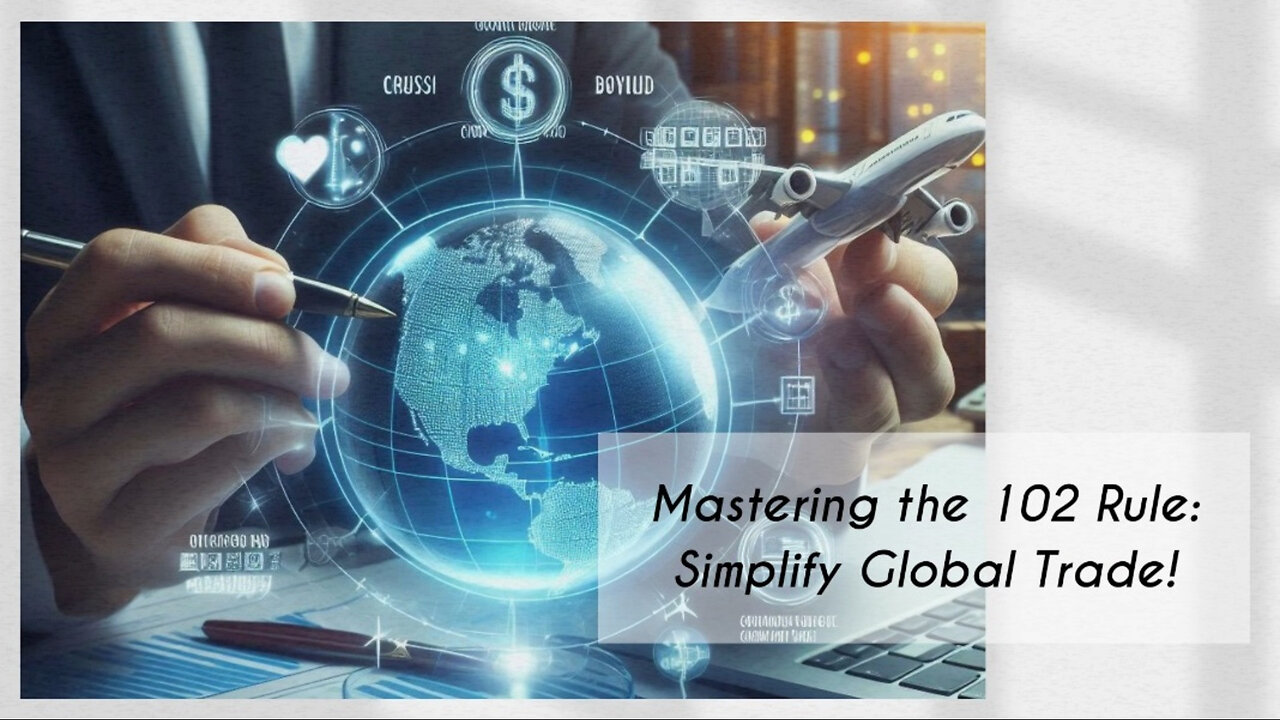Premium Only Content

Unraveling the Complexity of the 10 2 Rule: The Role of Customs Brokers
License To Import // 323-578-6432 // [email protected] // www.licensetoimport.com
The 10+2 rule, also known as the Importer Security Filing (ISF) and Additional Carrier Requirements, is a regulation implemented by US Customs and Border Protection (CBP) in 2009 to enhance cargo security. It requires importers and ocean carriers to provide detailed information about the contents of a shipment before it arrives in the United States. The goal of the rule is to identify potential security risks and prevent any threats to national security.
The 10+2 rule includes ten data elements that must be provided by the importer and two data elements that must be provided by the ocean carrier. Importers are responsible for submitting information such as the seller's name and address, the buyer's name and address, the manufacturer's name and address, and a detailed description of the goods. Ocean carriers, on the other hand, must provide information about the vessel, container, and shipment.
Navigating the 10+2 rule can be challenging due to the complexity of gathering and transmitting the required data accurately and in a timely manner. Many importers rely on customs brokers to handle this process on their behalf. Customs brokers act as intermediaries between the importer and CBP, ensuring that all necessary information is collected, properly documented, and submitted within the required timeframe. Their expertise in customs regulations and documentation is crucial in meeting the stringent requirements of the 10+2 rule.
In addition to the 10+2 rule, customs brokers also play a significant role in helping importers obtain customs bonds. Customs bonds are financial guarantees that ensure the payment of duties, taxes, and other fees associated with the importation of goods. Importers are required to obtain a customs bond before engaging in international trade, and customs brokers can assist in securing the appropriate bond based on the importer's needs.
Customs brokers provide valuable advice and guidance to importers, not only on complying with customs regulations but also on other aspects of international trade. They have in-depth knowledge of customs procedures, tariff classifications, valuation of goods, and trade agreements. By leveraging their expertise, customs brokers help importers navigate the complexities of importing goods, ensuring compliance with regulations while optimizing cost and efficiency.
In conclusion, customs brokerage involves navigating regulations such as the 10+2 rule and obtaining customs bonds. Customs brokers play a crucial role in ensuring compliance with customs regulations, collecting and submitting accurate data, and providing valuable guidance throughout the importation process. Their expertise helps importers overcome challenges and streamline their operations while ensuring they meet all legal requirements.
#usimportbond #isfcustomsbroker #uscustomsclearing #isfentry
Video Disclaimer Here: This video is solely for education and is not endorsed by any US government agency.
0:30 The 10+2 rule, implemented in 2009 by U.S. Customs and Border Protection, requires importers and ocean carriers to provide detailed information about shipments before arrival in the U.S. to enhance cargo security.
1:04 The rule consists of 10 data elements to be provided by importers and 2 data elements by ocean carriers, including details about the goods, vessel, container, and shipment.
1:41 Navigating the 10+2 rule can be complex, and many importers rely on customs brokers to accurately gather and transmit required data within the specified timeframe.
-
 1:51
1:51
License To Import
27 days agoHow And When To File ISF For Telescope And Microscope Accessories
141 -
 4:02:20
4:02:20
Nerdrotic
13 hours ago $19.01 earnedKimmel MELTDOWN | Hollywood Boycotts Disney | Friday Night Tights 372 with Kaida
115K19 -
 34:08
34:08
Bannons War Room
7 hours agoMEGYN KELLY: Jimmy Kimmel and Sore Cultural Losers, and Charlie Kirk's Spiritual Revival, w/ Bannon
77.6K84 -
 59:27
59:27
NAG Podcast
8 hours agoBrandon Straka: BOLDTALK with Angela Belcamino
69K11 -
 59:43
59:43
Sarah Westall
6 hours agoVietnam Shuts down 86 Million Bank Accounts, The Fourth Turning & more w/ Andy Schectman
52.5K11 -
 1:17:51
1:17:51
Flyover Conservatives
13 hours agoMary Flynn O’Neill and Clay Clark: The Church Must Rise or America Falls | FOC Show
42.5K11 -
 3:36:01
3:36:01
I_Came_With_Fire_Podcast
15 hours agoThe Global ANTIFA Connection You've Never Heard Of | The Israel Question
38K9 -
 16:38
16:38
RTT: Guns & Gear
23 hours ago $4.69 earnedExtar EP9 Review: The Best Budget 9mm PCC?
53.1K6 -
 7:53
7:53
Rethinking the Dollar
16 hours agoMass Firings in Tech: The Real Agenda Behind 166,000 Cuts
58K15 -
 1:02:28
1:02:28
BonginoReport
10 hours agoFeds Monitor Threats Ahead of Kirk Memorial - Nightly Scroll w/ Hayley Caronia (Ep.138)
264K153